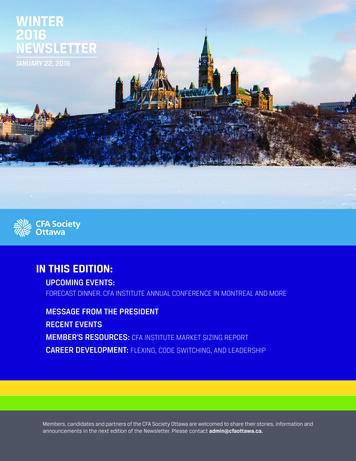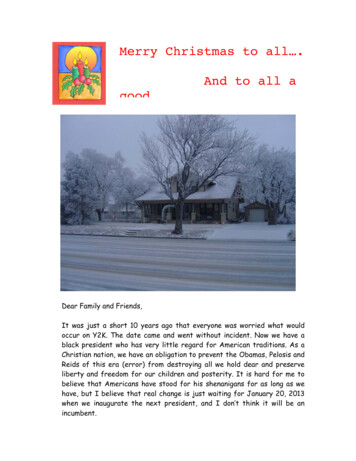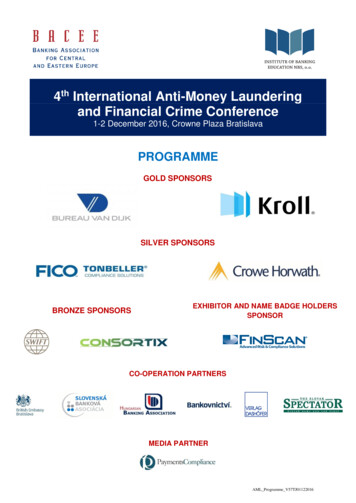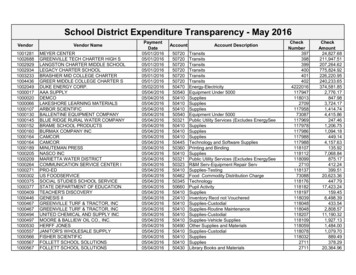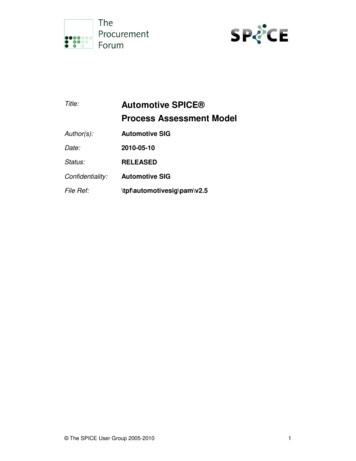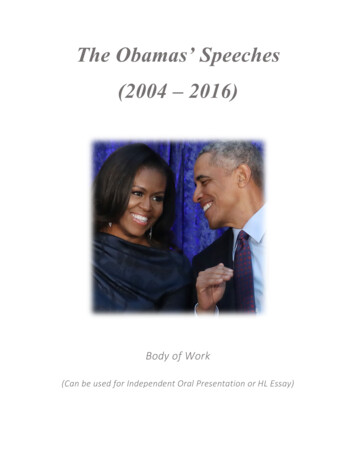
Transcription
The Obamas’ Speeches(2004 – 2016)Body of Work(Can be used for Independent Oral Presentation or HL Essay)
Contextual Information / Timeline 1988: Obama is a summer associate at the Chicago law firm Sidley &Austin. 1992: Obama graduates from Harvard and returns to Chicago. 1995: In July, Obama—at age 34—publishes his first memoir, DreamsFrom My Father: A Story of Race and Inheritance. In August, Obama filespaperwork to run for incumbent Alice Palmer's Illinois Senate seat. 1996: In January, Obama has his four competitor petitions invalidated; heemerges as the only candidate. In November, he is elected to the IllinoisSenate, which is controlled by Republicans. 1999: Obama begins running for Congress. 2000: Obama loses his challenge for the congressional seat held by Rep.Bobby Rush. 2002: In November, Democrats usurp Republican control of the IllinoisSenate. 2003–04: Obama amasses his legislative record and serves as chair of theHealth and Human Services Committee. 2003: Obama begins running for U.S. Senate; the leading Democraticcandidate withdraws in 2004 due to a sex scandal. David Axelrod beginshaving camera crews video virtually everything Obama does in public. Heuses this footage to create a five-minute online video for the Jan. 16, 2007,announcement that Obama is running for president. 2004: In March, Obama wins the primary with 52% of the vote. In June,his Republican opponent Jack Ryan withdraws due to a sex scandal. Hedelivers the Democratic National Convention address in July 2004, and inNovember he is elected to the U.S. Senate with 70% of the vote. 2005: Obama files paperwork for his leadership PAC, The Hope Fund, inJanuary. Shortly after his election to the U.S. Senate, he delivers a well-
received address arguing faith should have a greater role in publicdiscourse. 2006: Obama writes and publishes his book The Audacity of Hope. InOctober, he announces he is considering a run for the presidency of theUnited States. 2007: In February, Obama announces his candidacy for U.S. president. 2008: In June, he becomes the Democratic Party's presumptive nominee.In November, he defeats Republican presidential nominee John McCain tobecome the first African-American president of the United States ofAmerica and the 44th president of the country. 2009: Obama is inaugurated in January. In his first 100 days in office, heexpands health care insurance for children and provides legal protectionfor women seeking equal pay. He gets Congress to pass a 787 billionstimulus bill to promote short-term economic growth, and he also cutstaxes for working families, small businesses and first-time home buyers.He loosens the ban on embryonic stem cell research and improves relationswith Europe, China, Cuba, and Venezuela. The president is awardedthe 2009 Nobel Peace Prize for his efforts. 2010: Obama delivers his first State of the Union speech in January. InMarch, he signs his health care reform plan, known as the Affordable CareAct, into law. Opponents of the act claim that it violates the U.S.Constitution. In August, announces the partial withdrawal of troops fromIraq, declaring an end to America's combat mission. The full withdrawalwill be completed the next year. 2011: Obama signs the Budget Control Act to rein in governmentspending. He also signs a repeal of the military policy known as Don't Ask,Don't Tell, which prevents openly gay troops from serving in U.S. ArmedForces. In May, he green lights a covert operation in Pakistan that leads to
the killing of al-Qaeda leader Osama bin Laden by a team of U.S. NavySEALs. 2012: Obama begins running for his second term, and in November, hewins with nearly 5 million more votes than Republican Mitt Romney. 2013: Obama gets a legislative victory with a bipartisan agreement on taxincreases and spending cuts, which is a step toward keeping his reelectionpromise of reducing the federal deficit by raising taxes on the wealthy. InJune, his approval ratings tank because of an alleged cover-up of events inBenghazi, Libya, that left U.S. Ambassador Christopher Stevens and twoother Americans dead; because of allegations that the IRS is targetingconservative political organizations seeking tax-exempt status; and due torevelations about the U.S. National Security Agency's surveillanceprogram. The Obama administration struggles with many domestic andinternational problems. 2014: Obama orders sanctions on Russia because of its annexation ofCrimea. House Speaker John Boehner sues the president, claiming he hasoverstepped his executive powers regarding some parts of the AffordableCare Act. Republicans gain control of the Senate, and now Obama has tocontend with the fact that Republicans control both houses of Congressduring the final two years of his second term. 2015: At his second State of the Union address, he claims that the UnitedStates is out of the recession. With Democrats outnumbered, he threatensto use his executive powers to stave off any potential Republicaninterference in his agenda. Obama has two major Supreme Court victoriesin this year: The Affordable Care Act's tax subsidies are upheld, and samesex marriage becomes legal nationwide. Also, Obama and the five worldpowers (China, France, Germany, Russia, and the United Kingdom) reacha historic nuclear deal with Iran. And Obama launches his Clean PowerPlan to reduce greenhouse gases and emissions.
2016: In his final year in office, Obama tackles gun control but is met withstrong opposition from both parties. He delivers his final State of theUnion address on January 12, 2016. In March, he becomes the first sittingU.S. president since 1928 to visit Cuba. 2017: Obama delivers his farewell address in January in Chicago. Duringhis last day in office on January 19 he announces that he will commute thesentences of 330 nonviolent drug offenders. Also in his final days,Obama presents Vice President Joe Biden with the Presidential Medal ofFreedom with Distinction.
Remarks by the First Lady at TuskegeeUniversity Commencement AddressTuskegee University, Tuskegee AlabamaMay 09, 2015MRS. OBAMA: Thank you all. (Applause.) Thank you so much. (Applause.) Let’s let ourgraduates rest themselves. You’ve worked hard for those seats! (Applause.)Let me start by thanking President Johnson for that very gracious introduction, and forawarding me with this honorary degree from an extraordinary institution. I am proud tohave this degree -- very proud. (Applause.) Thank you. Thank you so much. (Applause.)I want to recognize Major General Williams; Congresswoman Sewell; Zachary; Kalauna;to all of the trustees, the faculty, the staff here at Tuskegee University. Thank you -thank you so much for this warm welcome, this tremendous hospitality. And I'm soglad to be here. (Applause.)Before I begin, I just want to say that my heart goes out to everyone who knew andloved Eric Marks, Jr. I understand he was such a talented young man, a promisingaerospace engineer who was well on his way to achieving his dream of following in thefootsteps of the Tuskegee Airmen. And Eric was taken from us far too soon. And ourthoughts and prayers will continue to be with his family, his friends, and this entirecommunity. (Applause.)I also have to recognize the Concert Choir. Wow, you guys are good! Well done!(Applause.) Beautiful song. (Applause.) And I have to join in recognizing all the folks upin the stands -- the parents, siblings, friends -- (applause) -- so many others who havepoured their love and support into these graduates every step of the way. Yeah, this isyour day. (Applause.) Your day. (Applause.)Now, on this day before Mother’s Day, I’ve got to give a special shout-out to all themoms here. (Applause.) Yay, moms! And I want you to consider this as a public serviceannouncement for anyone who hasn’t bought the flowers or the cards or the gifts yet -all right? I’m trying to cover you. (Laughter.) But remember that one rule is “keep momhappy.” (Laughter.) All right? (Applause.)And finally, most of all, I want to congratulate the men and women of the TuskegeeUniversity Class of 2015! (Applause.) T-U!AUDIENCE: You know!
MRS. OBAMA: I love that. (Applause.) We can do that all day. (Laughter.) I'm so proudof you all. And you look good. (Applause.) Well done!You all have come here from all across the country to study, to learn, maybe have alittle fun along the way -- from freshman year in Adams or Younge Hall - - (applause) -to those late night food runs to The Coop. (Applause.) I did my research. (Applause.) Tothose mornings you woke up early to get a spot under The Shed to watch the GoldenTigers play. (Applause.) Yeah! I've been watching! (Laughter.) At the White House wehave all kinds of ways. (Laughter.)And whether you played sports yourself, or sang in the choir, or played in the band, orjoined a fraternity or sorority -- after today, all of you will take your spot in the long lineof men and women who have come here and distinguished themselves and thisuniversity.You will follow alums like many of your parents and grandparents, aunts and uncles -leaders like Robert Robinson Taylor, a groundbreaking architect and administrator herewho was recently honored on a postagestamp. (Applause.) You will follow heroes like Dr. Boynton Robinson -- (applause) -who survived the billy clubs and the tear gas of Bloody Sunday in Selma. The story ofTuskegee is full of stories like theirs -- men and women who came to this city, seizedtheir own futures, and wound up shaping the arc of history for African Americans andall Americans.And I’d like to begin today by reflecting on that history -- starting back at the timewhen the Army chose Tuskegee as the site of its airfield and flight school for blackpilots. (Applause.)Back then, black soldiers faced all kinds of obstacles. There were the so- calledscientific studies that said that black men’s brains were smaller than white men’s.Official Army reports stated that black soldiers were “childlike,” “shiftless,” “unmoraland untruthful,” and as one quote stated, “if fed, loyal and compliant.”So while the Airmen selected for this program were actually highly educated -- manyalready had college degrees and pilots licenses -- they were presumed to be inferior.During training, they were often assigned to menial tasks like housekeeping orlandscaping. Many suffered verbal abuse at the hands of their instructors. When theyventured off base, the white sheriff here in town called them “boy” and ticketed themfor the most minor offenses. And when they finally deployed overseas, white soldiersoften wouldn’t even return their salutes.Just think about what that must have been like for those young men. Here they were,trained to operate some of the most complicated, high-tech machines of their day -flying at hundreds of miles an hour, with the tips of their wings just six inches apart. Yet
when they hit the ground, folks treated them like they were nobody -- as if their veryexistence meant nothing.Now, those Airmen could easily have let that experience clip their wings. But as you allknow, instead of being defined by the discrimination and the doubts of those aroundthem, they became one of the most successful pursuit squadrons in our military.(Applause.) They went on to show the world that if black folks and white folks couldfight together, and fly together, then surely -- surely -- they could eat at a lunch countertogether. Surely their kids could go to school together. (Applause.)You see, those Airmen always understood that they had a “double duty” -- one to theircountry and another to all the black folks who were counting on them to pave the wayforward. (Applause.) So for those Airmen, the act of flying itself was a symbol ofliberation for themselves and for all African Americans.One of those first pilots, a man named Charles DeBow, put it this way. He said that atakeoff was -- in his words -- “a never-failing miracle” where all “the bumps wouldsmooth off. [you’re] in the air. out of this world. free.”And when he was up in the sky, Charles sometimes looked down to see black folks outin the cotton fields not far from here -- the same fields where decades before, theirancestors as slaves. And he knew that he was taking to the skies for them -- to givethem and their children something more to hope for, something to aspire to.And in so many ways, that never-failing miracle -- the constant work to rise above thebumps in our path to greater freedom for our brothers and sisters -- that has alwaysbeen the story of African Americans here at Tuskegee. (Applause.)Just think about the arc of this university’s history. Back in the late 1800s, the schoolneeded a new dormitory, but there was no money to pay for it. So Booker T.Washington pawned his pocket watch to buy a kiln, and students used their barehands to make bricks to build that dorm -- and a few other buildings along the way.(Applause.)A few years later, when George Washington Carver first came here for his research,there was no laboratory. So he dug through trash piles and collected old bottles, andtea cups, and fruit jars to use in his first experiments.Generation after generation, students here have shown that same grit, that sameresilience to soar past obstacles and outrages -- past the threat of countrysidelynchings; past the humiliation of Jim Crow; past the turmoil of the Civil Rights era. Andthen they went on to become scientists, engineers, nurses and teachers incommunities all across the country -- and continued to lift others up along the way.(Applause.)
And while the history of this campus isn’t perfect, the defining story of Tuskegee is thestory of rising hopes and fortunes for all African Americans.And now, graduates, it’s your turn to take up that cause. And let me tell you, youshould feel so proud of making it to this day. And I hope that you’re excited to getstarted on that next chapter. But I also imagine that you might think about all thathistory, all those heroes who came before you -- you might also feel a little pressure,you know -- pressure to live up to the legacy of those who came before you; pressureto meet the expectations of others.And believe me, I understand that kind of pressure. (Applause.) I’ve experienced a littlebit of it myself. You see, graduates, I didn’t start out as the fully-formed First Lady whostands before you today. No, no, I had my share of bumps along the way.Back when my husband first started campaigning for President, folks had all sorts ofquestions of me: What kind of First Lady would I be? What kinds of issues would I takeon? Would I be more like Laura Bush, or Hillary Clinton, or Nancy Reagan? And thetruth is, those same questions would have been posed to any candidate’s spouse.That’s just the way the process works. But, as potentially the first African AmericanFirst Lady, I was also the focus of another set of questions and speculations;conversations sometimes rooted in the fears and misperceptions of others. Was I tooloud, or too angry, or too emasculating? (Applause.) Or was I too soft, too much of amom, not enough of a career woman?Then there was the first time I was on a magazine cover -- it was a cartoon drawing ofme with a huge afro and machine gun. Now, yeah, it was satire, but if I’m really beinghonest, it knocked me back a bit. It made me wonder, just how are people seeing me.Or you might remember the on-stage celebratory fist bump between me and myhusband after a primary win that was referred to as a “terrorist fist jab.” And over theyears, folks have used plenty of interesting words to describe me. One said I exhibited“a little bit of uppity-ism.“ Another noted that I was one of my husband’s “cronies ofcolor.” Cable news once charmingly referred to me as “Obama’s Baby Mama.”And of course, Barack has endured his fair share of insults and slights. Even today,there are still folks questioning his citizenship.And all of this used to really get to me. Back in those days, I had a lot of sleeplessnights, worrying about what people thought of me, wondering if I might be hurting myhusband’s chances of winning his election, fearing how my girls would feel if theyfound out what some people were saying about their mom.But eventually, I realized that if I wanted to keep my sanity and not let others defineme, there was only one thing I could do, and that was to have faith in God’s plan for
me. (Applause.) I had to ignore all of the noise and be true to myself -- and the restwould work itself out. (Applause.)So throughout this journey, I have learned to block everything out and focus on mytruth. I had to answer some basic questions for myself: Who am I? No, really, who amI? What do I care about?And the answers to those questions have resulted in the woman who stands beforeyou today. (Applause.) A woman who is, first and foremost, a mom. (Applause.) Look, Ilove our daughters more than anything in the world, more than life itself. And while thatmay not be the first thing that some folks want to hear from an Ivy-league educatedlawyer, it is truly who I am. (Applause.) So for me, being Mom-in-Chief is, and alwayswill be, job number one.Next, I’ve always felt a deep sense of obligation to make the biggest impact possiblewith this incredible platform. So I took on issues that were personal to me -- issues likehelping families raise healthier kids, honoring the incredible military families I’d met onthe campaign trail, inspiring our young people to value their education and finishcollege. (Applause.)Now, some folks criticized my choices for not being bold enough. But these were mychoices, my issues. And I decided to tackle them in the way that felt most authentic tome -- in a way that was both substantive and strategic, but also fun and, hopefully,inspiring.So I immersed myself in the policy details. I worked with Congress on legislation, gavespeeches to CEOs, military generals and Hollywood executives. But I also worked toensure that my efforts would resonate with kids and families -- and that meant doingthings in a creative and unconventional way. So, yeah, I planted a garden, and hulahooped on the White House Lawn with kids. I did some Mom Dancing on TV. Icelebrated military kids with Kermit the Frog. I asked folks across the country to weartheir alma mater’s T-shirts for College Signing Day.And at the end of the day, by staying true to the me I’ve always known, I found that thisjourney has been incredibly freeing. Because no matter what happened, I had thepeace of mind of knowing that all of the chatter, the name calling, the doubting -- all ofit was just noise. (Applause.) It did not define me. It didn’t change who I was. And mostimportantly, it couldn’t hold me back. I have learned that as long as I hold fast to mybeliefs and values -- and follow my own moral compass -- then the only expectations Ineed to live up to are my own.So, graduates, that’s what I want for all of you. I want you all to stay true to the mostreal, most sincere, most authentic parts of yourselves. I want you to ask those basicquestions: Who do you want to be? What inspires you? How do you want to give
back? And then I want you to take a deep breath and trust yourselves to chart yourown course and make your mark on the world.Maybe it feels like you’re supposed to go to law school -- but what you really want todo is to teach little kids. Maybe your parents are expecting you to come back homeafter you graduate -- but you’re feeling a pull to travel the world. I want you to listen tothose thoughts. I want you to act with both your mind, but also your heart. And nomatter what path you choose, I want you to make sure it’s you choosing it, and notsomeone else. (Applause.)Because here’s the thing -- the road ahead is not going to be easy. It never is,especially for folks like you and me. Because while we’ve come so far, the truth is thatthose age-old problems are stubborn and they haven’t fully gone away. So there willbe times, just like for those Airmen, when you feel like folks look right past you, or theysee just a fraction of who you really are.The world won’t always see you in those caps and gowns. They won’t know how hardyou worked and how much you sacrificed to make it to this day -- the countless hoursyou spent studying to get this diploma, the multiple jobs you worked to pay for school,the times you had to drive home and take care of your grandma, the evenings you gaveup to volunteer at a food bank or organize a campus fundraiser. They don't know thatpart of you.Instead they will make assumptions about who they think you are based on theirlimited notion of the world. And my husband and I know how frustrating thatexperience can be. We’ve both felt the sting of those daily slights throughout our entirelives -- the folks who crossed the street in fear of their safety; the clerks who kept aclose eye on us in all those department stores; the people at formal events whoassumed we were the “help” -- and those who have questioned our intelligence, ourhonesty, even our love of this country.And I know that these little indignities are obviously nothing compared to what folksacross the country are dealing with every single day -- those nagging worries thatyou’re going to get stopped or pulled over for absolutely no reason; the fear that yourjob application will be overlooked because of the way your name sounds; the agony ofsending your kids to schools that may no longer be separate, but are far from equal;the realization that no matter how far you rise in life, how hard you work to be a goodperson, a good parent, a good citizen -- for some folks, it will never be enough.(Applause.)And all of that is going to be a heavy burden to carry. It can feel isolating. It can makeyou feel like your life somehow doesn’t matter -- that you’re like the invisible man thatTuskegee grad Ralph Ellison wrote about all those years ago. And as we’ve seen overthe past few years, those feelings are real. They’re rooted in decades of structuralchallenges that have made too many folks feel frustrated and invisible. And those
feelings are playing out in communities like Baltimore and Ferguson and so manyothers across this country. (Applause.)But, graduates, today, I want to be very clear that those feelings are not an excuse tojust throw up our hands and give up. (Applause.) Not an excuse. They are not anexcuse to lose hope. To succumb to feelings of despair and anger only means that inthe end, we lose.But here’s the thing -- our history provides us with a better story, a better blueprint forhow we can win. It teaches us that when we pull ourselves out of those lowestemotional depths, and we channel our frustrations into studying and organizing andbanding together -- then we can build ourselves and our communities up. We can takeon those deep-rooted problems, and together - - together -- we can overcomeanything that stands in our way.And the first thing we have to do is vote. (Applause.) Hey, no, not just once in a while.Not just when my husband or somebody you like is on the ballot. But in every electionat every level, all of the time. (Applause.) Because here is the truth -- if you want tohave a say in your community, if you truly want the power to control your own destiny,then you’ve got to be involved. You got to be at the table. You’ve got to vote, vote,vote, vote. That’s it; that's the way we move forward. That’s how we make progress forourselves and for our country.That’s what’s always happened here at Tuskegee. Think about those students whomade bricks with their bare hands. They did it so that others could follow them andlearn on this campus, too. Think about that brilliant scientist who made his lab from atrash pile. He did it because he ultimately wanted to help sharecroppers feed theirfamilies. Those Airmen who rose above brutal discrimination -- they did it so the wholeworld could see just how high black folks could soar. That’s the spirit we’ve got tosummon to take on the challenges we face today. (Applause.)And you don’t have to be President of the United States to start addressing things likepoverty, and education, and lack of opportunity. Graduates, today - - today, you canmentor a young person and make sure he or she takes the right path. Today, you canvolunteer at an after-school program or food pantry. Today, you can help your youngercousin fill out her college financial aid form so that she could be sitting in those chairsone day. (Applause.) But just like all those folks who came before us, you’ve got to dosomething to lay the groundwork for future generations.That pilot I mentioned earlier -- Charles DeBow -- he didn’t rest on his laurels aftermaking history. Instead, after he left the Army, he finished his education. He became ahigh school English teacher and a college lecturer. He kept lifting other folks upthrough education. He kept fulfilling his “double duty” long after he hung up hisuniform.
And, graduates, that’s what we need from all of you. We need you to channel themagic of Tuskegee toward the challenges of today. And here’s what I really want youto know -- you have got everything you need to do this. You’ve got it in you. Becauseeven if you’re nervous or unsure about what path to take in the years ahead, I want youto realize that you’ve got everything you need right now to succeed. You’ve got it.You’ve got the knowledge and the skills honed here on this hallowed campus. You’vegot families up in the stands who will support you every step of the way. And most ofall, you’ve got yourselves -- and all of the heart, and grit, and smarts that got you tothis day.And if you rise above the noise and the pressures that surround you, if you stay true towho you are and where you come from, if you have faith in God’s plan for you, thenyou will keep fulfilling your duty to people all across this country. And as the yearspass, you’ll feel the same freedom that Charles DeBow did when he was taking off inthat airplane. You will feel the bumps smooth off. You’ll take part in that “never-failingmiracle” of progress. And you’ll be flying through the air, out of this world -- free.God bless you, graduates. (Applause.) I can’t wait to see how high you soar. Love youall. Very proud. Thank you. (Applause.)
REMARKS BY THE FIRST LADY AT THEDEMOCRATIC NATIONAL CONVENTIONWells Fargo CenterPhiladelphia, PennsylvaniaJuly 25, 2016MRS. OBAMA: Thank you all. (Applause.) Thank you so much. You know, it’s hard tobelieve that it has been eight years since I first came to this convention to talk with youabout why I thought my husband should be President. (Applause.) Remember how Itold you about his character and conviction, his decency and his grace -– the traits thatwe’ve seen every day that he’s served our country in the White House.I also told you about our daughters –- how they are the heart of our hearts, the center ofour world. And during our time in the White House, we’ve had the joy of watching themgrow from bubbly little girls into poised young women -– a journey that started soonafter we arrived in Washington, when they set off for their first day at their new school.I will never forget that winter morning as I watched our girls, just seven and ten yearsold, pile into those black SUVs with all those big men with guns. (Laughter.) And I sawtheir little faces pressed up against the window, and the only thing I could think was,“What have we done?” (Laughter.) See, because at that moment, I realized that ourtime in the White House would form the foundation for who they would become, andhow well we managed this experience could truly make or break them.That is what Barack and I think about every day as we try to guide and protect our girlsthrough the challenges of this unusual life in the spotlight -- how we urge them to ignorethose who question their father’s citizenship or faith. (Applause.) How we insist that thehateful language they hear from public figures on TV does not represent the true spiritof this country. (Applause.) How we explain that when someone is cruel, or acts like abully, you don’t stoop to their level -– no, our motto is, when they go low, we go high.(Applause.)With every word we utter, with every action we take, we know our kids are watching us.We as parents are their most important role models. And let me tell you, Barack and Itake that same approach to our jobs as President and First Lady, because we know thatour words and actions matter not just to our girls, but to children across this country –kids who tell us, “I saw you on TV, I wrote a report on you for school.” Kids like the littleblack boy who looked up at my husband, his eyes wide with hope, and he wondered, “Ismy hair like yours?” (Applause.)
And make no mistake about it, this November, when we go to the polls, that is whatwe’re deciding -– not Democrat or Republican, not left or right. No, this election, andevery election, is about who will have the power to shape our children for the next fouror eight years of their lives. (Applause.) And I am here tonight because in this election,there is only one person who I trust with that responsibility, only one person who Ibelieve is truly qualified to be President of the United States, and that is our friend,Hillary Clinton. (Applause.)See, I trust Hillary to lead this country because I’ve seen her lifelong devotion to ournation’s children –- not just her own daughter, who she has raised to perfection –(applause) -- but every child who needs a champion: Kids who take the long way toschool to avoid the gangs. Kids who wonder how they’ll ever afford college. Kids whoseparents don’t speak a word of English but dream of a better life. Kids who look to us todetermine who and what they can be.You see, Hillary has spent decades doing the relentless, thankless work to actuallymake a difference in their lives -- (applause) -- advocating for kids with disabilities as ayoung lawyer. Fighting for children’s health care as First Lady and for quality child carei
Contextual Information / Timeline 1988: Obama is a summer associate at the Chicago law firm Sidley & Austin. 1992: Obama graduates from Harvard and returns to Chicago. 1995: In July, Obama—at age 34—publishes his first memoir, Dreams From My Father: A Story of Race and Inheritance.In August, Obama files

